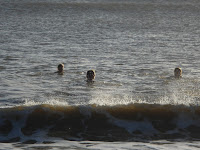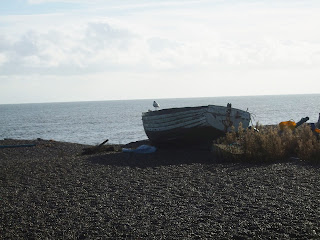This post is for anyone anywhere who wonders if poetry in the sea is viable – as a reading, an event, performance art or just for fun. The answer’s yes to most of those even in testing conditions, though as a reading you’d need sea calmer than we had.
 Our
experiment took place early on a blue-and-gold November morning, the Sunday of
Poetry in Aldeburgh. The sea had that
molten-metal look, very very bright in the low sun; wrinkled by the wind and
running big breakers into shore. Caroline
Wiseman of the Lookout tower, who swims every day that it’s possible, led the
way down the beach to find the best place to plunge in without being
overturned. Briony Bax, Joanna Clark, Lisa
Kelly and I followed. Caroline swam off
southwards, looking as though she’d make it to Orford Ness and beyond, and the
rest of us flipped around in the waves, trod water and spoke our poems in turn. Each poem had something to do with the
sea. Yes, it was cold – but we all stayed
in for all four poems. And we had an
audience, small but distinguished. See Nell Nelson’s blog for their perspective. She and Selina Rodrigues took the swimming photos.
Our
experiment took place early on a blue-and-gold November morning, the Sunday of
Poetry in Aldeburgh. The sea had that
molten-metal look, very very bright in the low sun; wrinkled by the wind and
running big breakers into shore. Caroline
Wiseman of the Lookout tower, who swims every day that it’s possible, led the
way down the beach to find the best place to plunge in without being
overturned. Briony Bax, Joanna Clark, Lisa
Kelly and I followed. Caroline swam off
southwards, looking as though she’d make it to Orford Ness and beyond, and the
rest of us flipped around in the waves, trod water and spoke our poems in turn. Each poem had something to do with the
sea. Yes, it was cold – but we all stayed
in for all four poems. And we had an
audience, small but distinguished. See Nell Nelson’s blog for their perspective. She and Selina Rodrigues took the swimming photos.  Spectators
rather than audience. The four of us in
the water could all hear each other. Those
on land could snatches of words at first, and then... I was prepared for the waves to drown our
voices (each time I’d checked the weather forecast in the days before, the wind
speed had strengthened; on the day it was probably around 15mph). But I hadn’t reckoned with the longshore
drift. It was powerful and moved us
southwards along the shore quite fast; by the time we noticed this the
spectators had receded. You can hear what they heard: Aldeburgh blogger Ben Rogers was there and recorded… well, mostly
the sea but you can find voices among the roar.
Spectators
rather than audience. The four of us in
the water could all hear each other. Those
on land could snatches of words at first, and then... I was prepared for the waves to drown our
voices (each time I’d checked the weather forecast in the days before, the wind
speed had strengthened; on the day it was probably around 15mph). But I hadn’t reckoned with the longshore
drift. It was powerful and moved us
southwards along the shore quite fast; by the time we noticed this the
spectators had receded. You can hear what they heard: Aldeburgh blogger Ben Rogers was there and recorded… well, mostly
the sea but you can find voices among the roar.
 Anyway,
we all loved doing it. The event got a
lot of attention and support. Next year
I want to do it again: ideally with more performers. The snag with that is it’s best done early in
the day, before programmed events start and so that people can go back home afterwards
for a hot shower and breakfast. And who
wants to get up early on the Sunday morning of a festival? Though a cold swim
is the best hangover cure I know. Also
the time couldn’t be confirmed until the weekend itself, given the changeable
weather. Though I’ve discovered a website that forecasts local wave height (plus wind strength etc), by the
hour. So: maybe more precise forecasting
and lots of publicity in advance. And
consultation among potential swimmers to see what they think about timing. Cold water swimmers who go to the festival,
you’ll be hearing from me!
Anyway,
we all loved doing it. The event got a
lot of attention and support. Next year
I want to do it again: ideally with more performers. The snag with that is it’s best done early in
the day, before programmed events start and so that people can go back home afterwards
for a hot shower and breakfast. And who
wants to get up early on the Sunday morning of a festival? Though a cold swim
is the best hangover cure I know. Also
the time couldn’t be confirmed until the weekend itself, given the changeable
weather. Though I’ve discovered a website that forecasts local wave height (plus wind strength etc), by the
hour. So: maybe more precise forecasting
and lots of publicity in advance. And
consultation among potential swimmers to see what they think about timing. Cold water swimmers who go to the festival,
you’ll be hearing from me!  There
will be a festival next year, or possibly two.
The volunteers of Poetry in Aldeburgh did a brilliant job. They delivered a lot of events, from small to
large and from interesting to very memorable. And they broke even, on a budget
at the low end of five figures. Strengthened
by their success they have undertaken to do it again next year, the same
weekend, 3-5 November. And the Poetry
Trust have got a transition grant from the Arts Council to plan for a 2017 festival
too. Snape festival with Aldeburgh fringe?
Who knows; from the audience perspective what matters is that there will
be poetry (this time last year there was the prospect of none).
There
will be a festival next year, or possibly two.
The volunteers of Poetry in Aldeburgh did a brilliant job. They delivered a lot of events, from small to
large and from interesting to very memorable. And they broke even, on a budget
at the low end of five figures. Strengthened
by their success they have undertaken to do it again next year, the same
weekend, 3-5 November. And the Poetry
Trust have got a transition grant from the Arts Council to plan for a 2017 festival
too. Snape festival with Aldeburgh fringe?
Who knows; from the audience perspective what matters is that there will
be poetry (this time last year there was the prospect of none).
The photo just above is of Maggi
Hambling’s scallop on the beach, some way north of where we swam. The late afternoon moon is in the gap. The words are from Benjamin Britten’s opera Peter Grimes: "I hear those voices
that will not be drowned".







